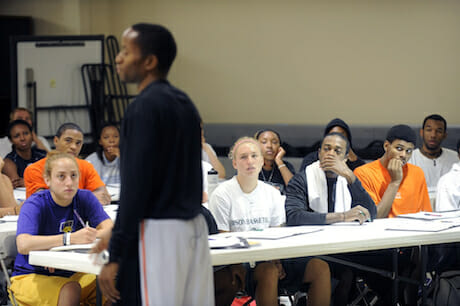How to get Your Basketball Camps and Clinics Running Smoothly

If you’re running a basketball camp or conducting a basketball clinic for players or coaches anytime soon, you’re going to have one big problem on your hands. The moment you open the gym doors and let your basketball players out for lunch break, a water break, or at the end of day, it can be hard to get them back.
How do you get these teenagers and young adults back in the room? Or, equally as challenging, how do you get busy basketball coaches at a coaches clinic to arrive on time for your next session? Do you become a sheep-dog, herding the sheep back into the pen? There will always be stragglers. Or, do you become the dictatorial tyrant issuing threats and conjuring notions of eternal damnation?
Now imagine for a moment that your basketball camps are like our Point Guard College sessions: two to three times a day we have high school basketball players, college athletes, and busy basketball coaches eagerly attend classroom sessions, sit attentively and feverishly take notes on what’s being covered. They show up on time too! (Well, 99 times out of 100, that is. But we can live with that batting average!)
Teachers are always amazed, needless to say. Our directors continually have parents and observing coaches ask us how we get a group of people to spend time during the summer in a classroom – much less at a ‘basketball camp’. Well coaches, it’s time you stop playing sheep dog, burning valuable energy running after people. But how on earth can you get an audience of young basketball players back into a room without saying a word or issuing ominous threats?
Here are some thoughts shared by author, Sean D’Souza, mixed in with some PGC-isms that will help:
‘Crowd control’ is a matter of two steps:
- The pre-sell.
- The follow through.
The pre-sell involves several stages:
- Precise time that’s not rounded off.
- Anchoring of the crowd to ‘one’ sound.
- Mentioning the factor of time early and often.
- Getting people to tell you when they’ll be back.
- Being clear about how you’ll act.
- Creating a cliff hanger.
- Make the time part of the deal—and don’t give rewards.
Non-Rounded Times: The biggest mistake a lot of coaches, teachers, and presenters make is they give rounded off timings. What does that mean? They say: “Be back at 1:00 p.m.” It should never be rounded off. It should be 12:57 p.m. That’s specific. It’s precise and not commonplace. Because it’s different it acts as a trigger that gets peoples’ attention, or at least piques their curiosity. The non-rounded timing creates urgency – and precision.
Dick DeVenzio used this approach all the time. For example, he never agreed to meet at 9 a.m. It was always 8:57 a.m. or 9:13 a.m. or 9:02 a.m. or 8:46 a.m., or something like that. It was a lesson in precision, plus it made things fun. At PGC, we now refer to this approach as “DeVenzio Time.” (I’ll share more on that in a later blog.)
Anchoring of the crowd to ‘one’ sound: All good coaches know this and so does every good parent. Regardless of who it is you’re presenting to, basketball players, coaches, even your own kids for that matter; they must develop an immediate and every-time response to certain sounds. As a parent, it could be the sound of your voice amidst the chaos of others kids playing in a park. When you call out to your child with urgency, they should respond.
Well, as a coach, one of the best tools in your arsenal (besides your own voice of course) is your whistle. As a presenting basketball coach, one of your major responsibilities is to take the thought process out of as many situations as possible and turn them into quick reactions – requiring no thought at all. Use of your whistle is a great place to start.
In your basketball clinic, camp, or practice, develop a Pavlovian response to the sound of your whistle. At PGC, we keep it simple. When athletes hear one whistle, it means they stop. When they hear the sound of two toots of the whistle, they come running to where ever the Director is located.
Remember, you can’t have the same action mean two different things. That is, in one instance a single whistle means hustle in; whereas at another time it means freeze. As D’Souza says: “You have to anchor them to ONE song.” So when they come into your training program or clinic, they respond to your signal on cue – immediately and every time.
Lay The Groundwork By Emphasizing Time Over And Over Again, Early and Often: At least two or three instances before and during the introduction, time is mentioned as being important. At PGC we’ll do this early and often. It’s one of those temporary inconveniences that can lead to a permanent improvement at every basketball drill, huddle, team meeting, or (in our case) classroom session. Instilling a shared understanding of the value of time is crucial.
Early on we will drive home the message of showing up on time for a classroom or court session. We’ll also suggest that there is value in being early. However, it’s not about getting people to believe in being early for the sake of being early. That’s silly. Instead, it’s about getting people to buy-in to the notion that being early is about maximizing their time. It’s a lesson in helping people to understand the messages they send by being on time, late, or (as a best case) being early.
We make a big deal about it. Not for our sake, but theirs. Successful coaches (as well as all highly successful people) are very jealous of their time, and they expect others to help them maximize their time. We do too.
Get People To Tell You When They’ll Be Back: Before we finish a session, whether it be on-court skills training or in-class teaching, PGC Directors will ask athletes to tell them when they’re going to be back. This is where the ‘primacy-recency’ effect comes into play. We all have a tendency to remember what takes place first and last.
Most of us, even though a lot of time has passed, remember our first kiss. Most can give some pretty vivid details about the experience too. Similarly, most of us can recall our last kiss; whether it was this morning before leaving home or a few weeks ago (as you wallow in a dry spell). Our clearest memories are typically the first and last time we do something.
Eliminate confusion and forgetfulness right away. We say to the athletes: “The classroom session starts at 6:58 p.m. So what time does the classroom session start?” And the athletes respond, “6:58 p.m”. They said it, and they understand it. No confusion and they know they’ve told you what time the session starts.
Remember, these are the habits of good coaches. All-time winning-est coach in Division 1 basketball, Don Meyer, calls it ‘echoing yells’. He has his players , in unison, call out and repeat the instruction, point of emphasis, play entry or drill name.
If you get people to verbalize something, they’re more likely to do it.
Be Clear On How You’ll Act: D’Souza says: “I have this stock statement: I will start on time. If there are five of you in the room I will begin. If there are three I will begin. If there’s no one I will talk to myself. And I never, ever, ever wait. I will always start on time.”
Love it! At PGC, we have a similar mantra. The goal isn’t necessarily to get people back on time. It’s to do what YOU say you’re going to do. In this case, that means starting when you say you’ll start, no matter what the conditions. To borrow the line, “If you reward the late-comers (for whatever reason) you’re setting an instantly bad precedent. There is NEVER, NEVER, NEVER any excuse that’s valid for starting late. You simply do not wait for late comers. You do that once, and they’ll expect you to do it again.”
If your habit, as a coach/teacher/team captain, is to wait for late comers, then you’ve defined the team culture as one that accommodates the lowest denominator. This is important. Avoid creating this precedent like the plague.
Create A Cliff Hanger: TV and movies do it all the time. They leave you hanging in limbo, eagerly awaiting the next episode or sequel. Radio does it too. They create anticipation by telling you what’s to come to get you to tune in.
This concept is easily transferred over to a basketball camp setting or coach’s clinic. End on a cliff hanger. Give people a little teaser – like a good appetizer – for what’s to come. Then start right on time. Those who are inclined to arrive late will know that they’re going to miss that key moment in the plot.
Never Reward Expected Behavior: Just like being clear on how you’ll act, this stage is tone setting. “Never give any rewards for being early or on time. That’s just a bribe. They didn’t earn it. No one pays you an extra bonus when you reach the dentist on time. Kids don’t get rewards because they’re in their seat at school. It sends out the wrong message when you reward someone for what they should be doing anyway. So no reward whatsoever.” This is the expectation. Those that want to be responsible (for winning a championship) know that responsibility comes with that. Big dreams = Big responsibilities.
All that just lays the groundwork in the ‘pre-sell’. To summarize:
- Use a specific time that’s not rounded off.
- Anchor your audience to ‘one’ sound.
- Mention the importance of time early and often.
- Get people to ‘echo’ commitments back to you.
- Be clear, in advance, about how you’ll act.
- Create a cliff hanger that makes them want more.
- Make time a part of the expectation—and don’t reward baseline behavior.
The second part is the follow through.
You must do what you say you’re going to do. You can’t say one thing and do another. You can’t let outside pressure steer you off course. You’re running the show. You’re the pack leader. The maestro, as D’Souza calls it. “You’re the conductor of [expectation]. When you raise the baton, the music begins. The musicians don’t come in later as they please. You raise your baton and they play.”
Stay committed to your commitments. Others will learn to do the same when they participate in your basketball camps or coaching clinics.
Take the time to set the tone for expectations, create the environment, model the behavior, and then stay the course. Execute your game plan.
What are some things that you do to ensure that your basketball camps, coach’s clinic or presentation runs smoothly? Share your ideas and suggestions below in the comments section.
Related Articles
Two Youth Basketball Organizations from the Jr. Nba’s Flagship Network Partner up to ‘teach the Game the Way It’s Meant to Be Played’
For the first time in history, two best-in class youth basketball organizations and members of the Jr. NBA Flagship Network – PGC Basketball and Pro Skills Basketball – have entered into an official partnership.
PGC Announces 2023 Fall Shooting College Schedule Dates & Locations
PGC Announces 2023 Fall Shooting College Schedule Dates & Locations
About PGC
PGC Basketball provides intense, no-nonsense basketball training for players and coaches. Our basketball camps are designed to teach players of all positions to play smart basketball, be coaches on the court, and be leaders in practices, games and in everyday life.
We combine our unique PGC culture with a variety of teaching methods and learning environments to maximize the learning potential of those that attend our sessions. In addition to spending 6-7 hours on the court each day, lessons will be reinforced through classroom sessions and video analysis.
Our goal at PGC is to empower you with the tools to fulfill your basketball dreams, while also assisting you in experiencing the joy of the journey.
To learn more about PGC Basketball, including additional basketball training tips and videos, visit our YouTube Channel or find us on Facebook, Instagram, and Twitter.













Share This Post